Al Ahli
Hospital
Emergency
Appeal
There are no winners in war…
AID has launched an emergency appeal for the Al Ahli Hospital in Gaza and for those who have been displaced, injured, or lost their livelihoods during the conflict. We are also raising funds from the Diocese of Jerusalem’s response in the West Bank, where conflict has spread.
UPDATE: 18th December 2024
Non-stop: Anglican Hospitals and Clinics working around the clock to serve those in need in Gaza and the West Bank
With other hospitals in northern Gaza besieged or forced to close in October 2024, ABM AID partner Al Ahli Hospital found itself inundated. Inundated not only with patients evacuated from other hospitals but also with medical staff fleeing those hospitals and offering their services at Al Ahli. Al Ahli was conducting emergency operations 24 hours per day, operating on 30-35 people per day.
This was in addition to hundreds of medical consultations carried out each day at Al Ahli Hospital and its field clinic in Khan Younis.
The Diocese of Jerusalem is not just concerned about those brought into its hospital in Gaza with wounds from bullets, shrapnel and falling concrete. It’s also concerned about the less reported problem of infected water and food.
WHO estimates that nine in ten children under five are affected by one or more infectious diseases. Cases of acute respiratory infections, acute jaundice and bloody diarrhea re on the rise. There has even been a resurgence of polio, a disease that has not been seen in the region for more than 25 years. Up to 14,000 patients require urgent evacuation from Gaza for specialized medical care.
The Hospital Responds to Children Affected by Psychological Trauma
Trauma is another feature of this war. The Ahli field clinic in Khan Younis now offers a Psychosocial Support Program for children who have experienced trauma. Most have lost family members. Some are orphans.
Co-ordinator of the Program, Ms Nevine Al-Shiekh, said, “The psychological support program aims to foster self-development and [help people] acquire skills to overcome difficulties and psychological pressures resulting from the war on the Gaza Strip. It also focusses on expressing emotions, and the ability to solve problems and life challenges. This program includes displaced children from both genders, from the Gaza Strip, aged between seven and 14 years, living in tents…The program consists of five sessions, each lasting 1.5 hours over five consecutive days. Each session has a specific goal.”
Noor is one of the children participating in the Khan Younis support program. She said, “The first thing when I came to the clinic to receive treatment for me and my mother, I saw the children playing. I asked to join them and play too. Initially, I didn’t have any friends, but then I made some, and I enjoyed my time with them.”
Noor’s mother added, “I’m from Gaza. I was displaced first to Rafah, and then to Khan Younis. My daughter contracted hepatitis. So, I took her to this medical point associated with Ah Ahli Arab Hospital. Thankfully, they treated her and provided her with the necessary fluids. I also learned about the psychosocial support program and wanted her to participate. She lost her father and her brother, and her uncles and cousins. She endured significant psychological pressure. The program has helped my daughter immensely and I’m grateful for the improvements she has experienced.”
Another child, Leen, who had lost her mother in the conflict, commented: “I joined the psychological support program…to address my difficulty sleeping, stress and anxiety. Since enrolling in the program, I have made significant improvements. I now sleep better and no longer feel anxiety or fear. I improved a lot.”
Conflict also continues in the West Bank. At least 780 Palestinians and 18 Israelis have been killed there since 7 Oct 2023 and at least 4,555 Palestinians have been forced from their homes. The economy in the West Bank is in tatters.
The Church also Supports People Affected by the Conflict in the West Bank
In the West Bank, also supported by ABM AID through the Diocese of Jerusalem, are two medical facilities (Saint Luke’s hospital and Penman Clinic) and a Kindergarten. These facilities all remain open, providing subsidised services to needy families. Inserted is a case study from a 69-year-old woman who received medical attention at Penman Clinic.
Across Gaza and the West Bank, ABM AID and other Anglican donors jointly funded medical attention for 1,388 patients in the period August-October 2024 and subsidised education for 20 kindergarten children.
Asma’s story
The Diocese of Jerusalem operates Penmen Clinic in Zababdeh-Jenin. The clinic has been providing health services to people who are unable to afford to pay normal healthcare costs in the West Bank.
Asma is a 69-year-old woman whose journey to the clinic was fraught with challenges. Hailing from Jaba’, a village near Zababdeh, she faced a daunting delay at an Israeli checkpoint, where she was forced to wait for two long hours before being allowed to pass. When she finally arrived at the clinic, she was in considerable distress, suffering from severe stomach inflammation, intestinal irritation, and swelling gas.
Upon her arrival, the doctor quickly assessed her condition and ordered the necessary laboratory tests and an abdominal ultrasound. The medical team were able to relieve Asma’s pain.
After returning home, Asma called the clinic to express her heartfelt thanks. She shared how vital their support had been, especially since she could not afford the cost of treatment. Her husband had lost his job in Israel due to the ongoing war, leaving their family in a precarious situation. The clinic’s compassionate care, offered free of charge, had made a profound difference in her life during this difficult time.
ABM AID appreciates the generous donations from our supporters and the tireless work of the Diocese of Jerusalem, through its hospitals, clinics, and kindergarten in the Gaza Strip (including Khan Younis) and the West Bank.
This appeal will therefore seek funds for the following:
- Costs of medical services for vulnerable outpatients at the Ahli Hospital – $100 average cost (includes consultation, lab tests, diagnosis and medications)
- Costs of medical services for vulnerable inpatients at the Ahli Hospital – $300 average cost per admission (includes consultation, surgery, tests, medications)
- Assistance to those injured, displaced or economically impacted by conflict in the West Bank
- Recovery phase for displaced residents of Gaza (expected to include economic and shelter assistance but details to come later, following assessment of gaps in needs).
We are hoping to raise $250,000 for this appeal.
AID wishes to thank all who have been supporting our appeal since last October.
You can read earlier updates on this appeal below.
PRAYER
FOR THOSE AFFECTED BY THE CONFLICT IN GAZA AND ISRAEL
Almighty and Everlasting God:
Our days are in your hands;
we lift up all those in the Holy Land who are victims of violence and injustice, that you might empower your Church to bring healing to the wounded, relief to the suffering, and comfort to those who mourn;
we pray also that you would soften the hearts of all those involved in the recent conflicts, that they would be led to work for justice and lasting peace in the land where your Son, our Lord Jesus Christ, first came to bring hope and abundant life to all people;
these things we ask in his Holy Name.
Amen.
Funds raised in excess of what is needed will go to similar work or to our rapid response fund.
AID asks you to donate responsibly. For more information see https://donateresponsibly.org/
TIMELINE
On 7 October 2023 the Palestinian military group Hamas launched an assault on Israel and took hostages. About 1,400 Israelis were killed and about 203 military and civilians were taken hostage. The Israeli military responded with air and artillery strikes and have begun a ground operation within the Gaza Strip.
On Saturday 14 October, the Anglican hospital in Gaza, Al-Ahli Hospital, was hit by rockets, severely damaging two upper floors in the mammography and ultrasound departments. Four hospital staff were wounded.
Gazan people, displaced from their homes, had been using the hospital and its surrounds to shelter from Israeli airstrikes when, on the night of Tuesday 17 October, a major explosion rocked the courtyard. It is estimated that between 200 and 500 people were killed in that explosion, and in fires which started in vehicles parked on the ground. Up to 600 more were injured.
By 24 October, the Israeli death toll remains at around 1,400, and the Palestinian death toll in Gaza has passed 4,000. Israel’s blockade on Gaza has meant food, water, medicines, and fuel have fast been running out, although convoys are now beginning to bring urgent supplies to the people.
ABM and AID express our deepest sympathies for all those affected by the continuing conflict, including the thousands of civilians who have been killed, injured, and displaced. We pray for an immediate ceasefire and for a resolution of the longer-term conflict that has caused so much suffering in Palestine over many decades.
The team at the Ahli hospital will schedule its staff to ensure that the hospital is accessible 24 hours a day. To enable the Ahli to respond to the increasing need at this time, staff have called for urgent medications and other resources for an emergency response which will enable more people to access basic health care during this crisis.
Please give generously in support of the Ahli Hospital’s emergency medical services at this time.
Archbishop Hosam has requested all of us to join him in the following prayer: “Please pray with us that this wave of violence will be stopped, as there are no winners in wars. All are losers”, he said.
EARLIER UPDATES
UPDATE: 14th October 2024
UPDATE: 14th October 2024
Al Ahli Hospital and a year of unspeakable horrors
Today marks one year since Al Ahli Hospital’s Cancer Treatment Centre was hit by rocket fire. This was part of another upsurge in a conflict between Israel and Palestinians that has been ongoing since at least 1948.
The upsurge in conflict, with a Hamas incursion into Israel followed by a larger Israeli incursion into Gaza has seen unspeakable horrors perpetrated against civilians. Many survivors in Gaza ended up at Al Ahli Hospital, run by ABM AID’s partner the Diocese of Jerusalem. Hospital staff found themselves operating, often without even anaesthetics, on children who had been crushed under concrete, torn by shrapnel, or shot. When food was available, staff handed it around to the hundreds of displaced people who gathered for safety in the hospital compound.
ABM AID supporters were quick to help. In October 2023, ABM AID sent funds that were used to keep Al Ahli’s hospital generators running. In February 2024, ABM AID contributed to a broader Anglican program that funded emergency medical care in Al Ahli Hospital.
By February 2024, the economy of the West Bank was in tatters because many who had previously worked in Israel had lost their jobs and many businesses in the West Bank, including those associated with tourism, were struggling. Therefore, the same Anglican program also subsidised some of the medical and education expenses of families affected by economic downturn in the West Bank.
From February to June 2024, the joint Anglican response enabled 1,139 civilians in Gaza to receive emergency medical care from Al Ahli hospital staff. It also enabled 1,584 civilians to receive subsidised medical care and 125 children to receive subsidised education from other institutions run by the Diocese of Jerusalem in the West Bank.
Since June 2024, the extreme violence has been ongoing, with the daily sound of bombs exploding. Displaced Gazans move from camp to camp to escape the bombings, scraping to find food and water in a landscape littered with destroyed buildings. Smaller-scale violence has also erupted in the West Bank between Palestinians and Israeli settlers.
In early September 2024, ABM AID sent further funding to the Diocese of Jerusalem to continue supporting Al Ahli Hospital in Gaza and providing subsidised medical care and education in the West Bank. Medical supply lines to Al Ahli Hospital, mainly through UN agencies, have become more reliable but the hospital is still treating many hundreds of out-patients per day as well as housing 75 in-patients and conducting 25-30 surgeries per day. Our funds contributed towards this treatment.
From mid-September, a long-term conflict between Israel and some groups in Lebanon suddenly escalated. The death toll in Lebanon, mainly from Israeli airstrikes, is now well over 2,000 people, The economies of Israel, Lebanon, and the West Bank have been deteriorating, leading to rising poverty, and the economy of Gaza is almost non-existent. The schools and clinics run by the Diocese of Jerusalem in the West Bank remain open but user-pay fees are drying up, so they are increasingly reliant on external funding.
Amid this suffering, AID acknowledges the human spirit shown by the tireless staff of the Diocese of Jerusalem (including medical workers), by those who have shared their food and living spaces with displaced families, and by those (like ABM supporters) who have contributed from afar.
Ahmed’s story below has ended happily for now, thanks to the dedicated work of the Ahli Hospital.
Ahmed’s Story
The Shuja’iyya neighbourhood, which suffered the most destruction from the occupying forces due to its proximity to the border, was left in dire conditions. Ahmed’s family, who lost their two-story home except for one room unfit for living, was displaced several times under shelling, only to return to the same house. Ahmed’s father was killed in the first week of the war. Water and food were the greatest concerns for every Palestinian in the area.
Ahmed, 35, left the tent he had erected on the ruins of his house when he learned that trucks were distributing flour at the Kuwait Roundabout south of Gaza. Like others, Ahmed walked for over an hour and waited for hours until a cart carrying flour bags arrived. People rushed to it as it was their only hope for flour, but they were surprised by Israeli soldiers shooting from an aircraft. Ahmed was hit in the leg and arms and could not walk. He lay on the ground until someone carried him on a cart pulled by a donkey. The driver mentioned that only Ahli Hospital was operational in Gaza City, and was receiving many injuries daily.
After about an hour, Ahmed arrived at the Ahli Hospital’s emergency room, having lost a lot of blood. A preliminary assessment by the emergency doctor revealed that he needed urgent surgery and possibly a leg amputation due to severe damage to the leg bone. He was quickly admitted to the orthopaedic department, where a specialist decided to proceed with surgery to stop the bleeding. The doctor, aware of the seriousness of the situation, relied on God for the operation.
After the surgery, the doctor exerted every effort to avoid amputating the leg, and the operation was successfully completed. Ahmed spent several days in the hospital, needing long-term physical therapy to recover. The hospital medical staff and doctors provided him with all necessary free treatment and physical therapy. After some time, his condition improved, and he thanked the medical staff, especially the orthopaedic specialist, for their successful surgery and the Ahli Hospital for the quality of healthcare provided and for waiving the service fees.
UPDATE: 15th July 2024
UPDATE: 15th July 2024
We thank God that, although the situation in Gaza remains extremely volatile, the Diocese of Jerusalem has reported that the Ahli Hospital was able to reopen as of last Friday 12 July. A statement from the Diocese says: “owing to the dedication and courage of our staff, it was possible to re-open Al Ahli Arab Hospital in Gaza City. Despite intense military activity in the areas surrounding the hospital, some staff were able to return. Most patients and others in need of medical attention have not yet been able to make the same hazardous journey. Our remarkable staff were able to perform eight surgeries in the day.
“The hospital ambulance which was hit by a sniper on Monday is severely damaged, but we report with great relief that the driver has returned to the hospital safe and unharmed, and there were no patients in the ambulance at the time of the attack.” Read the full statement here.
UPDATE: 9th July 2024
UPDATE: 9th July 2024
UPDATE: 28th May 2024
UPDATE: 28th May 2024
In case you are wondering about how funds get through to where they need to go, ABM AID sends all funds for this appeal to the Episcopal Diocese of Jerusalem & The Middle East, which operates the Al-Ahli Hospital and ensures all funds reach the hospital for the purposes outlined in the appeal.
We recently asked The Diocese of Jerusalem’s Programs Development Officer, Mrs Sawsan Aranki-Batato, how the funds are sent to Gaza and how people in Gaza access the funds and purchase necessary supplies etc.
AID question: How does the Dioc of Jerusalem send money to Al-Ahli? Are banks or ATMs in Gaza working? Or is the money just used in Israel/ West Bank to purchase materials, which are then trucked to Al Ahli from Jordan?
Diocese of Jerusalem answer: We make wire transfers to Ahli Hospital’s bank account and all purchases are done electronically.
Ahli Hospital purchases medical supplies from local suppliers, and they also get some supplies through the World Health Organisation (WHO) from time to time.
AID: How do you pay the staff at the hospital, and how do staff at Al-Ahli actually access the funds you put in their bank accounts?
Diocese of Jerusalem: The staff salaries are wired to their bank accounts, and they use ATMs to get their cash from banks.
Please continue to keep the Diocese of Jerusalem and all their outreach work, including that of the Al-Ahli Hospital in Gaza, in your prayers.
UPDATE: 16th May 2024
UPDATE: 16th May 2024
ABM AID’s partner, the Diocese of Jerusalem recently reported that the Al Ahli hospital treated 509 patients needing emergency medical interventions over the three-month period February to April 2024, and that this cost a total of USD50,900 (about $77,000).
AID is one of several church partners who are supporting Al Ahli’s relief work in Gaza. So far, ABM AID has contributed USD33,000 ($50,000) to this program which also enables the Diocese of Jerusalem to provide some support for families affected by the economic crisis in the West Bank.
The Diocese sincerely thanks all partners, including ABM AID and our generous supporters, for their ongoing commitment to the emergency response.
UPDATE: 9th April 2024
UPDATE: 9th April 2024
Go here to read about how the Diocese of Jerusalem is responding to the war in Gaza, through the eyes of the Rev’d Rachel Carnegie, Executive Director of the Anglican Alliance, whose appeal ABM AID is supporting.
UPDATE: 14th March 2024
UPDATE: 14th March 2024
The Archbishop of Jerusalem has sent this message to those supporting the emergency appeal for the Al-Ahli Hospital in Gaza.
“We are grateful for the support of all those who contributed to Anglicans in Development in support of our al-Ahli Hospital in Gaza, which has by a miracle of God remained open throughout the war to serve the hundreds of sick and wounded brought through its gates each week. Please continue to pray and advocate on behalf of all those who suffer throughout the Holy Land, even as we seek a just and lasting peace here in the very land where our Lord Jesus Christ took up his cross for our sake.”
The World Health Organization reports that it and its partners recently “completed a mission to Al-Ahli Arab and Al-Sahaba hospitals in northern Gaza yesterday. Both hospitals are functioning with limited capacity, and lack fuel, specialised staff, anaesthetic drugs, antibiotics, and internal fixation devices. We delivered orthopaedic and trauma items for 150 patients and 13,000L of fuel to the Al-Ahli Arab hospital…We need sustained, safe access to health facilities in order to supply them with urgently needed lifesaving healthcare on a regular basis.”
The UN Office for the Coordination of Humanitarian Affairs (UNOCHA) has posted this video which also relates to getting supplies to the Al-Ahli hospital: https://twitter.com/i/status/1766755953137897755
Last week Amnesty International reported a spike in killings of Palestinians in the West Bank, including by using lethal force without necessity or disproportionately during protests and arrest raids, and denying medical assistance to those injured. Between 7 October and 31 December 2023, 299 Palestinians were killed, marking a 50% increase compared to the first nine months of the year. At least 61 further Palestinians, including 13 children, have been killed so far in 2024 as of 29 January.
Please continue to pray and advocate in your churches and communities for a cessation to hostilities, with the return of hostages and captives, and a space to emerge for a lasting peace and justice to come about.
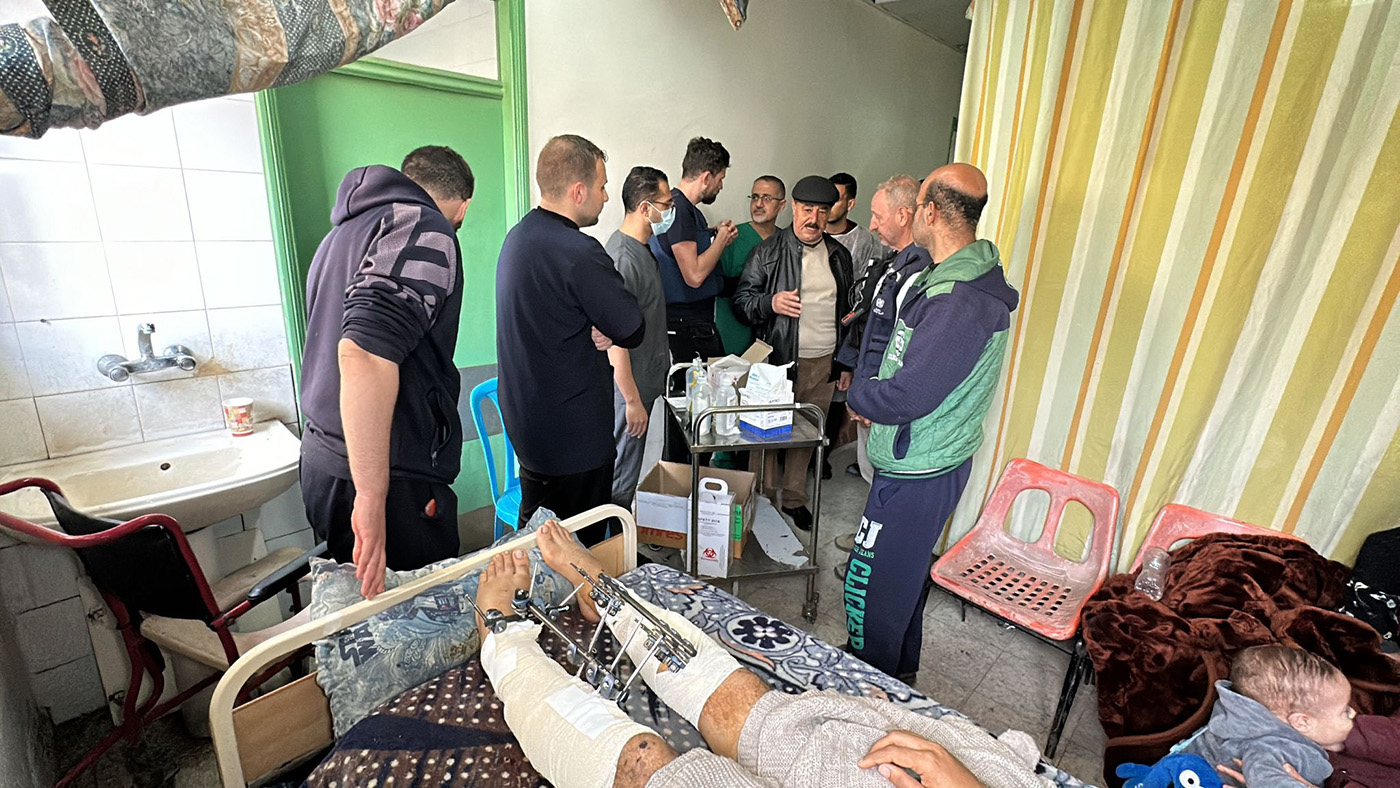
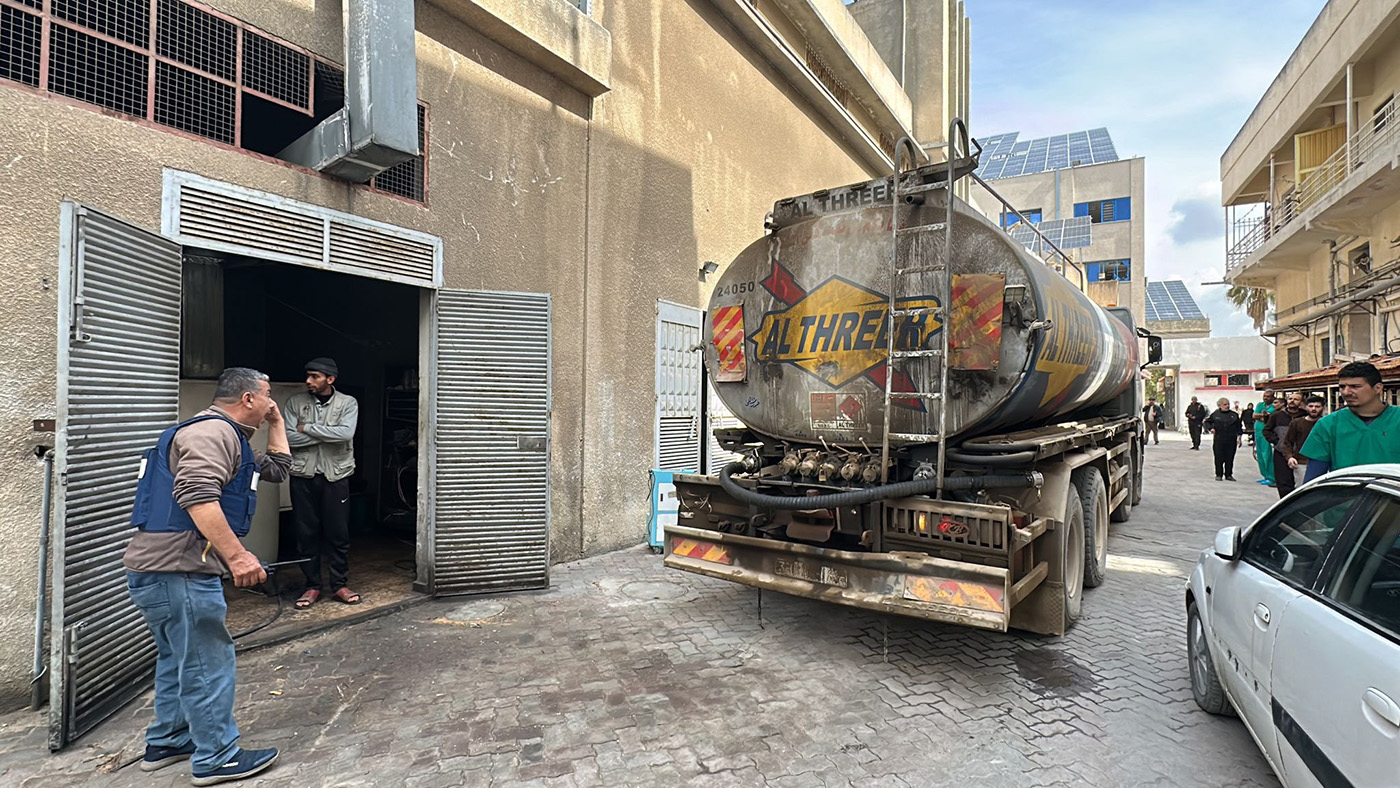
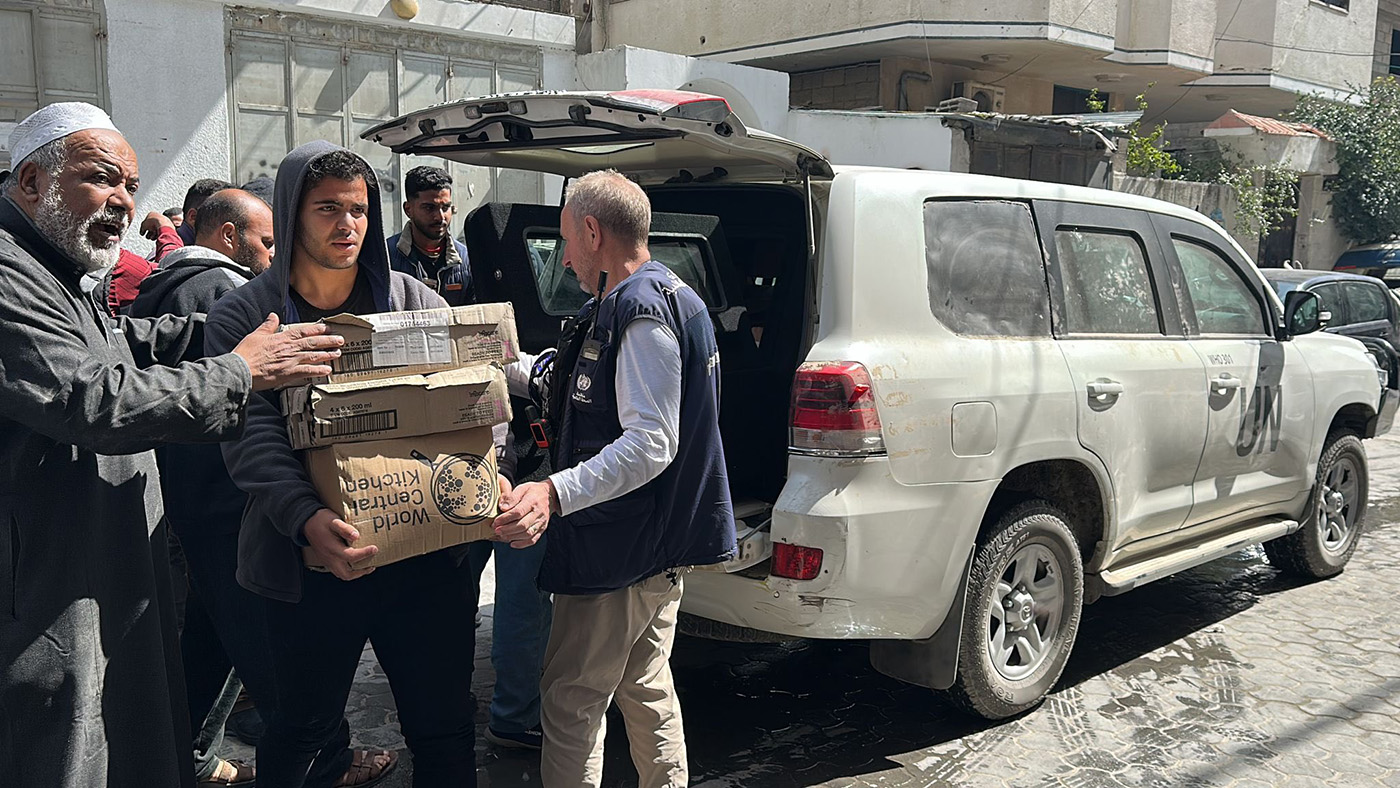
Photos are from the WHO showing their recent delivery of vital supplies to the Ahli (and Al-Sahaba) hospitals.
UPDATE: 8th February 2024
UPDATE: 8th February 2024
The Al-Ahli Hospital is one of the only functioning hospitals in Gaza as other hospitals have been damaged by airstrikes and are affected by the lack of fuel to power their generators.
The Ahli staff continue to implement a 24-hour emergency response plan. To meet the needs of increasing numbers of wounded and traumatized people, including children, the hospital has recruited more medical professionals to help them save the lives of hundreds of patients (though it still faces a shortage of medical supplies and skilled surgeons).
Since the beginning of the crisis, Al-Ahli staff have maintained an around-the-clock presence at the hospital, providing urgent medical care for those physically injured, particularly children who have been traumatized by the violence. In addition, they have received elective cases referred by other hospitals that are overwhelmed with thousands of injured patients. The Burn Care Unit has received hundreds of children with severe burns.
Surgical and orthopaedic supplies, food, and water are the most urgent needs. Beds and stretchers are also in short supply. Generators are only being used for sterilization procedures, which require greater wattage. This is draining the fuel capacity.
But the conflict in Gaza is also having a spillover effect in the West Bank.
In addition to the terrible and ongoing loss of life and damage to core infrastructure in Gaza, the shock to Palestinian economic activity has been severe. This is because of the war escalating to parts of the West Bank, where there are persistent clashes and restrictions on the movement of people and goods coming in and out. Therefore, up to 25% of funds raised for this appeal will go to addressing needs in the West Bank (with at least 75% going to needs in Gaza).
An estimated 40 percent of West Bank jobs have been lost since last October due to impacts of loss of tourism, cancelation of employment of Palestinians working in Israel, and non-payment of salaries to Palestinians due to international sanctions and the ending of Israeli support.
These families are no longer able to cover the cost of their basic needs, including health care and the school tuition fees of their children.
Additionally, St Luke’s Hospital in Nablus has started to receive injured and traumatised patients from conflict in the north, including Nablus, Tulkarem and Jenin.
UPDATE: 20th December 2023
UPDATE: 20th December 2023
The conflict in Gaza is having a spillover effect in the West Bank. Restrictions on movement between Israel and the West Bank have led to many job losses. Some bank transfers are also being blocked. Tourism-dependent businesses in the West Bank, including many hotels and restaurants, have closed and many other industries are experiencing supply chain disruptions. As joblessness and poverty rise, the Diocese of Jerusalem is called upon to assist through the health services and education institutions that it operates in the West Bank.
At the same time, AID’s relief assistance to Al Ahli hospital in Gaza has been forcibly delayed because the hospital is having difficulty accessing further supplies. AID is therefore widening its Gaza appeal to allocate a portion of funds to address needs in the West Bank.
The Diocesan response in the West Bank will cover the cost of the health services and education for the most vulnerable people who have been directly affected by the current situation and who are not able to cover the cost of the health services and tuition fees of their children at the Diocese institutions.
UPDATE: 14th December 2023
UPDATE: 14th December 2023
The WHO has reported on their recent experiences of making a humanitarian foray to deliver supplies to the Al-Ahli Hospital.
“Amid sky-high humanitarian needs in Gaza’s devastated north, Al-Ahli Hospital is severely short-staffed, Dr. Peeperkorn said, with over 200 patients but only enough resources to support 40. Unable to perform vascular operations, staff are carrying out limb amputations ‘as the last resort to save lives’.
Last Saturday a WHO-led UN and Palestine Red Crescent Society (PRCS) convoy encountered “serious incidents” during a mission to deliver trauma and surgical supplies for 1,500 patients to the hospital and transfer 19 critical patients and their companions to Nasser Medical Complex in south Gaza, the UN health agency said.
Dr. Peeperkorn described the numerous obstacles faced by this mission, including inspections at the Israeli military checkpoint at Wadi Gaza on the way north, where two PRCS staff were detained for over an hour. According to a statement released by the UN health agency on Tuesday, “WHO staff saw one of them being made to kneel at gunpoint and then taken out of sight, where he was reportedly harassed, beaten, stripped and searched”.
The WHO medic stressed that “nobody can be detained when they are part of a medical mission” and emphasized the fact that such vital humanitarian missions “cannot afford any delays”.
Dr. Peeperkorn said that arriving in north Gaza, which now “looks like a wasteland”, the humanitarians saw many people in the street surprised at the sight of the convoy, as there had been very little aid access to the north of the enclave for months now.
WHO has reiterated its call for the protection of health care and humanitarian assistance in Gaza.
Please continue to keep all people affected by this terrible war in your prayers.
You can read the whole story here:
‘Humanitarian disaster zone’: Gaza hospital capacity decimated – WHO | UN News
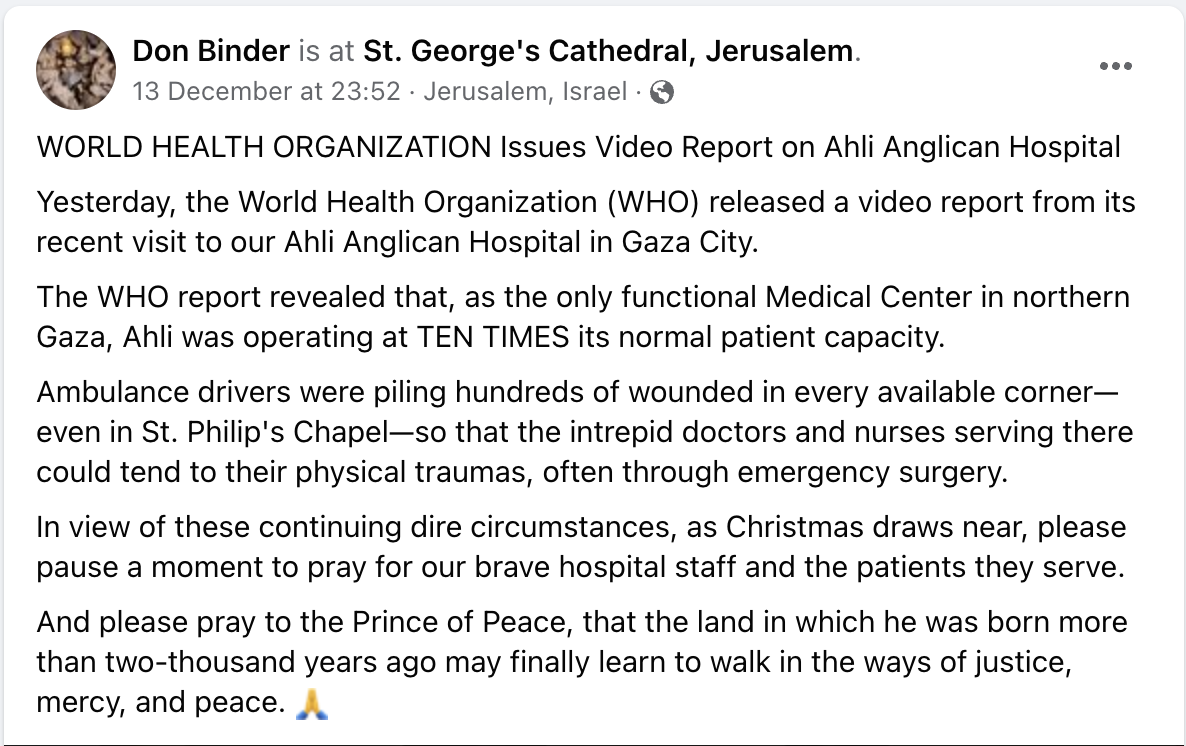
UPDATE: 4th December 2023
UPDATE: 4th December 2023
As the week-long ceasefire has ended and bombardment of Gaza resumes, we pray urgently for all people in Gaza, especially those who have lost loved ones, the wounded, and the traumatised, especially the children.
After about two weeks where the medical staff could only perform first aid, because out of surgical supplies, Al-Ahli Arab Hospital in Gaza is again open to serve the wounded in Gaza City.
During the ceasefire, deliveries of fuel, anaesthesia, ICU supplies, emergency drugs and IV fluids were made to the hospital, supervised by the WHO.
The hospital is the only one functioning in northern Gaza, and a huge overflow of patients is being held in the hospital’s St Philip’s Chapel. Most patients need more advance care and surgical intervention.
Doctors and nurses have responded to Al-Ahli’s calls for help, but they still need more vascular, neuro- and orthopaedic surgeons, and more drugs and medical supplies.
The Diocese and Al-Ahli are working with the United Nations, WHO and Red Cross/Red Crescent to address urgent needs.
As we continue to pray for the situation in Gaza, the Diocese of Jerusalem has asked also for prayers for those in East Jerusalem affected by soaring unemployment, food shortages and neighbourhood attacks as some settlers try to push out Palestinians from their homes.
To assist with our prayers, Archbishop Hosam has made available a set of Advent Reflections for “our beloved partners in the Gospel of Jesus Christ”. We encourage you to engage with these reflections during Advent.
UPDATE: 16th November 2023
UPDATE: 16th November 2023
The Diocese of Jerusalem has reported that Al-Ahli Arab Hospital is now the only functioning hospital in the north of Gaza. Other hospitals are not functioning due to lack of fuel and the damage caused by the airstrikes. The Ahli staff continue to provide 24-hour emergency response for the increasing number of wounded and traumatized people. They appealed for health professionals living nearby to join the staff in working to save the lives of hundreds of patients.
Each day, the Ahli is treating around 200 to 250 wounded, and performing up to 10 surgical operations, mostly in orthopaedics and plastic surgery.
Whilst mainly relying on solar energy, the Ahli’s generators are being used for sterilization procedures, which require greater wattage. This is draining the fuel capacity, which is at a level that may last as little as three weeks, depending on usage.
The banks in Gaza are operating, and so funds can be transferred for hospital staff salaries and the purchase of supplies.
Since the war began, the hospital has been able to procure three deliveries of medicines and medical supplies from Red Cross/Red Crescent and UNRWA (the UN Relief and Works Agency for Palestinian Refugees).
Click this link to read the full update from the Diocese of Jerusalem.
We ask you to continue to pray for:
- the people of Gaza
- the hospital staff
- all who are affected by this conflict in other parts of Palestine and Israel.
- an immediate ceasefire
- a just and lasting peace.
UPDATE: 24th October 2023
UPDATE: 24th October 2023
Ahli Hospital continues to provide urgent care for injured and all who need medical attention
Thank you to all who have generously given to our appeal for the Ahli Hospital in Gaza. Your gifts are much needed and greatly appreciated. AID has already sent the first tranche of funds to our partner, the Diocese of Jerusalem, but much, much more is needed.
The Anglican Archbishop in Jerusalem, the Most Reverend Hosam Naoum, has today issued a statement jointly with the Archbishop of Canterbury, the Most Reverend Justine Welby.
Archbishop Hosam writes: “As you have probably seen, a massive rocket blast exploded in the midst of our own Ahli Hospital in the heart of Gaza City, tragically killing or seriously wounding hundreds of refugees who had gathered there because they had no other place of shelter in which to go.
“Although the Ahli’s buildings were heavily damaged, two nights later our devoted staff partially re-opened the hospital. In doing this, they demonstrated the determination we have in the Diocese of Jerusalem to persevere in our Christian mission to serve others as though we were serving Christ himself (Matt 25:31-46). And this is the case not just for Gaza, but throughout all the Holy Land. Yet in order to accomplish this mission in the midst of a devastating war, we need to draw upon the strength of the larger Body of Christ. For we understand that when one member of the Body suffers, all parts suffer (1 Cor 12:26).
“And so, my sisters and brothers in Christ, I appeal to you first of all to pray for our mission here, as well for the peace of Jerusalem (Psa 122:6). Secondly, advocate with your representatives for a just and lasting peace in the Holy Land, so that all who dwell within these lands can live in security. Finally, if you are able, support our ministries in Gaza, Palestine and Israel, and throughout the diocese of Jerusalem by contributing financially through one of our international partners.”
Archbishop Justin’s statement concludes with the words: “I urge everyone, if they are able, to support the Al Ahli Hospital’s work caring for the wounded body of Jesus Christ and contribute to the Gaza appeal.”
Although food, medicines and water are still in very short supply, limited aid has now begun to filter in through the southern Gazan border at Rafah.
The Ahli Hospital, which is partly powered by solar energy, is still functioning and staff are providing medical and surgical services to people in greatest need.
Your donation to this appeal will contribute to the following areas.
- Urgent Medicines: $55,000
- Medical Consumables: $40,000
- ICU Equipment: $32,000
- Fuel (10,000 Litres): $27,000
- Extra staff: $47,000
- Psychosocial Support for Patients and their families: $24,000
- Food for patients, staff and their families: $21,000
- Hygiene kits: $90 each
UPDATE: 19th October 2023
UPDATE: 19th October 2023
Australian Anglican Primate calls for protection of civilians in Gaza
The following is a statement issued by Archbishop Geoffrey Smith, Primate of the Anglican Church of Australia, on the war in Israel/Palestine.
Please click here to view the statement.
UPDATE: 18th October 2023
Devastating news. Hundreds killed in strike on the Al-Ahli Hospital in Gaza.
Having already dealt with being hit by rockets on Saturday evening leaving four people injured, we are now deeply saddened to learn of a fatal strike on the Al Ahli Arab Hospital. Initial estimates suggest the death toll is at least 200 people, but possibly more than 500 people have been killed.
The hospital has recently served as a shelter for thousands of residents who fled their homes in northern Gaza seeking safety from Israeli airstrikes. Stranded residents are running out of medicine, food, water and power.
We ask you to join with us in prayer. We pray for an immediate ceasefire and for a resolution of the longer-term conflict that has caused so much suffering. We pray for the staff who continue to serve those in need despite danger to their own lives. We pray for all those who mourn.
The Archbishop in Jerusalem has called for a day of mourning. We now share with you the official statement. Please click here to view.
We will continue to put post updates here as we receive them.
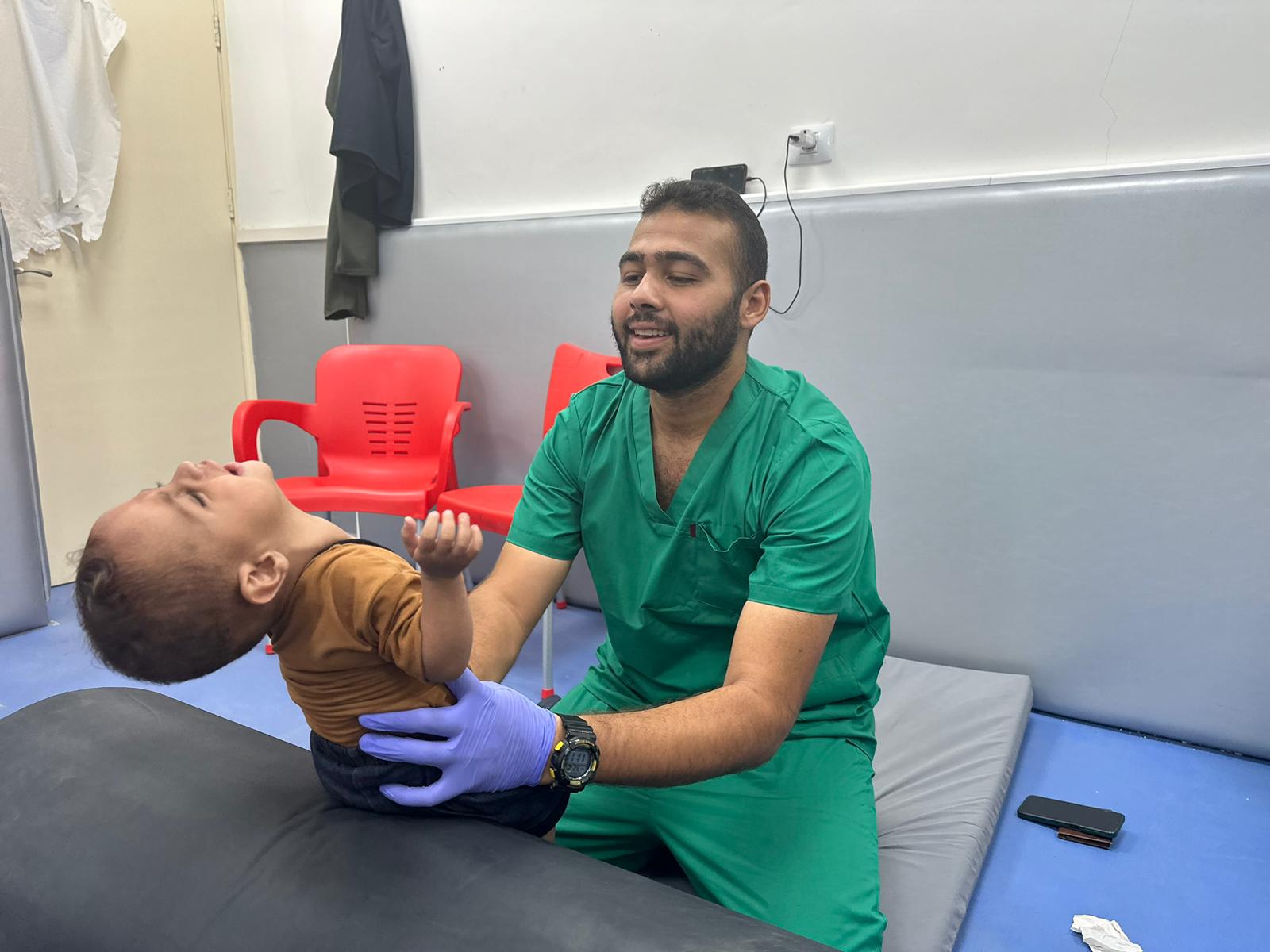
A staff member at Al Ahli Hospital checks a little boy who has been brought in by his father. © Al Ahli Hospital. Used with permission.
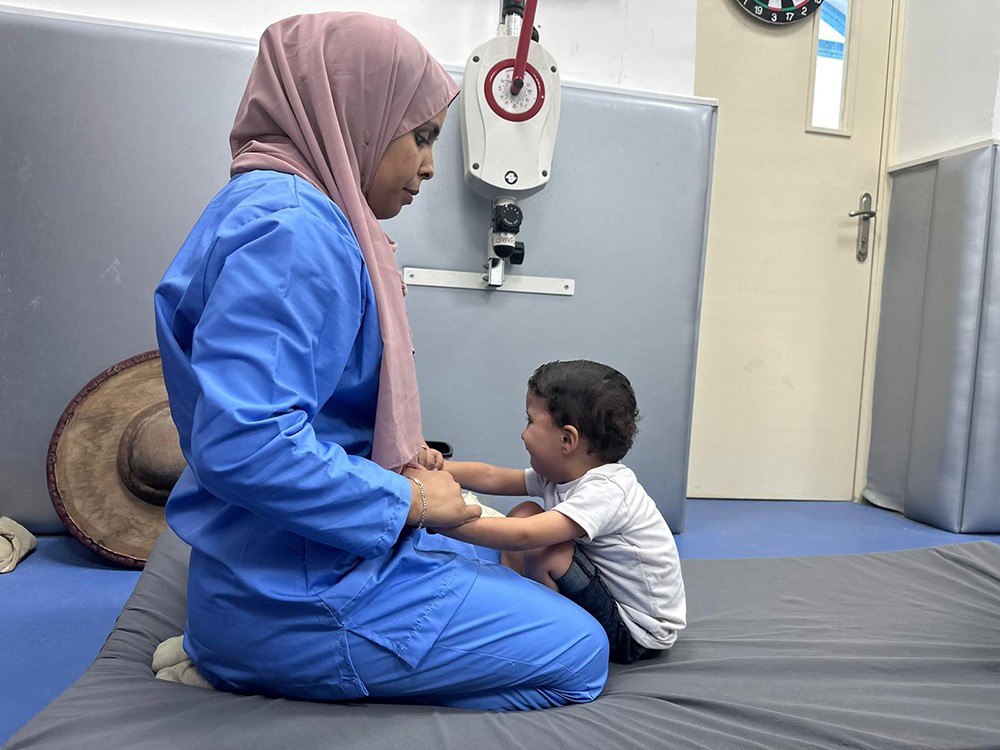
A staff member of Al Ahli Hospital provides comfort to a traumatised child. © Diocese of Jerusalem. Used with permission.
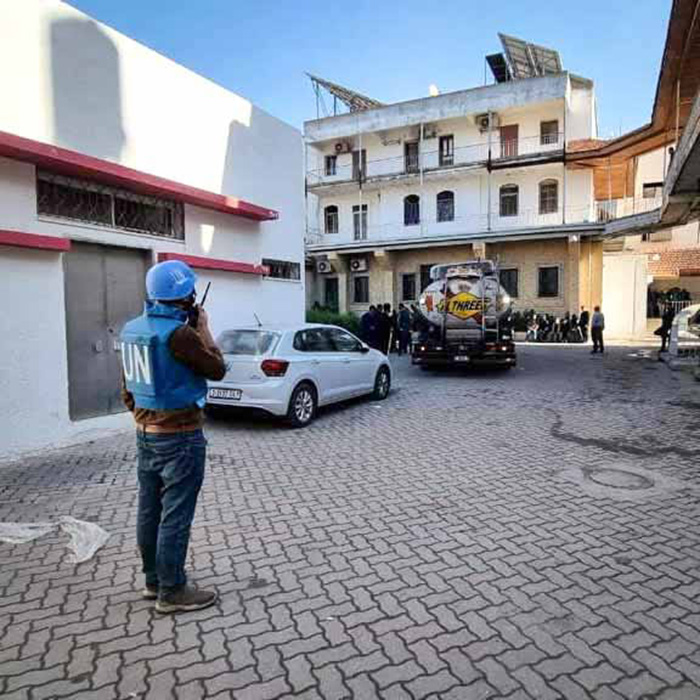
A UN aid worker oversees delivery of fuel to Al-Ahli hospital early in the ceasefire. © Diocese of Jerusalem. Used with permission.
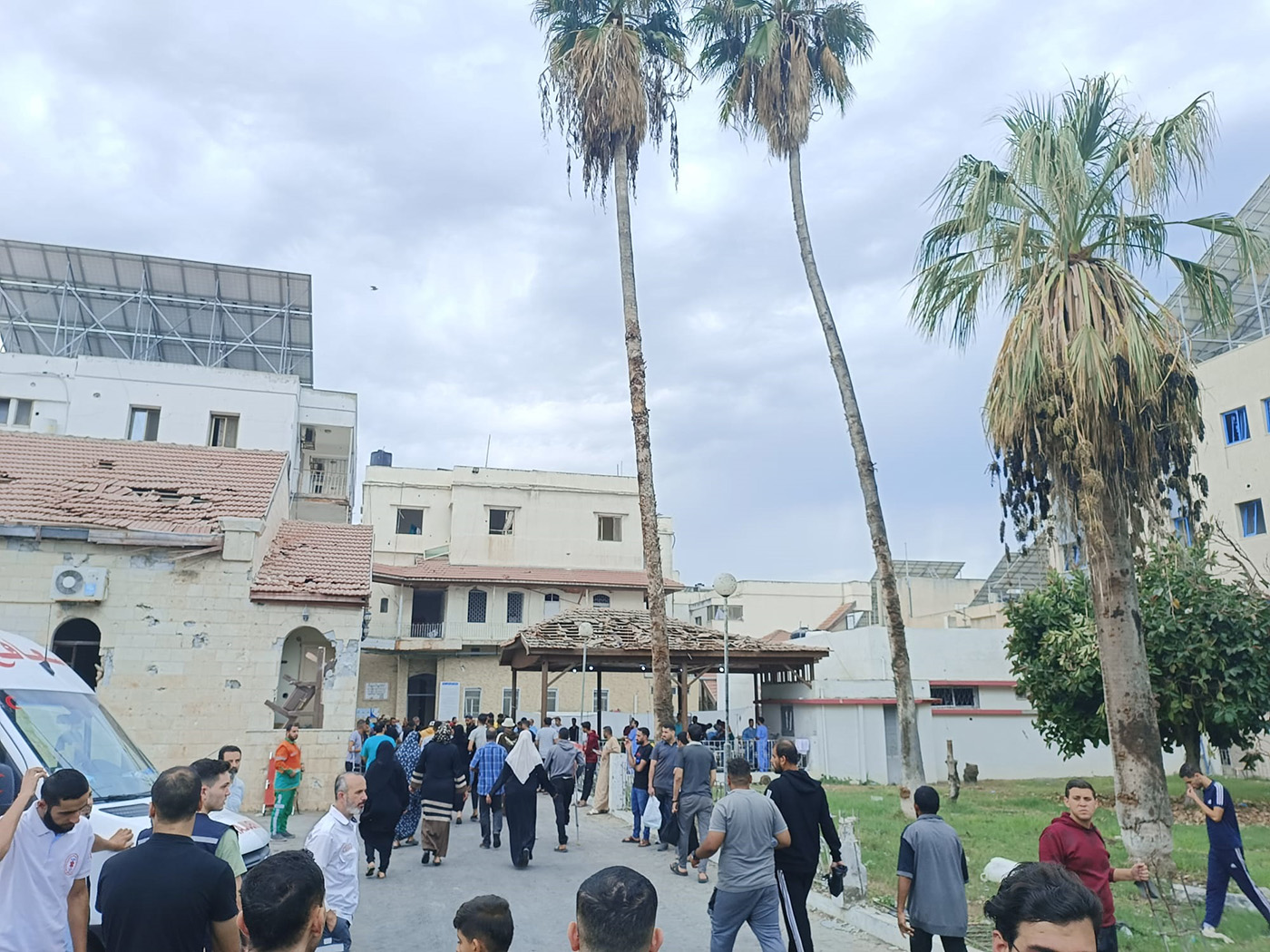
Medical staff at the Ahli are working around the clock to treat people injured in the ongoing war. © Diocese of Jerusalem. Used with permission.
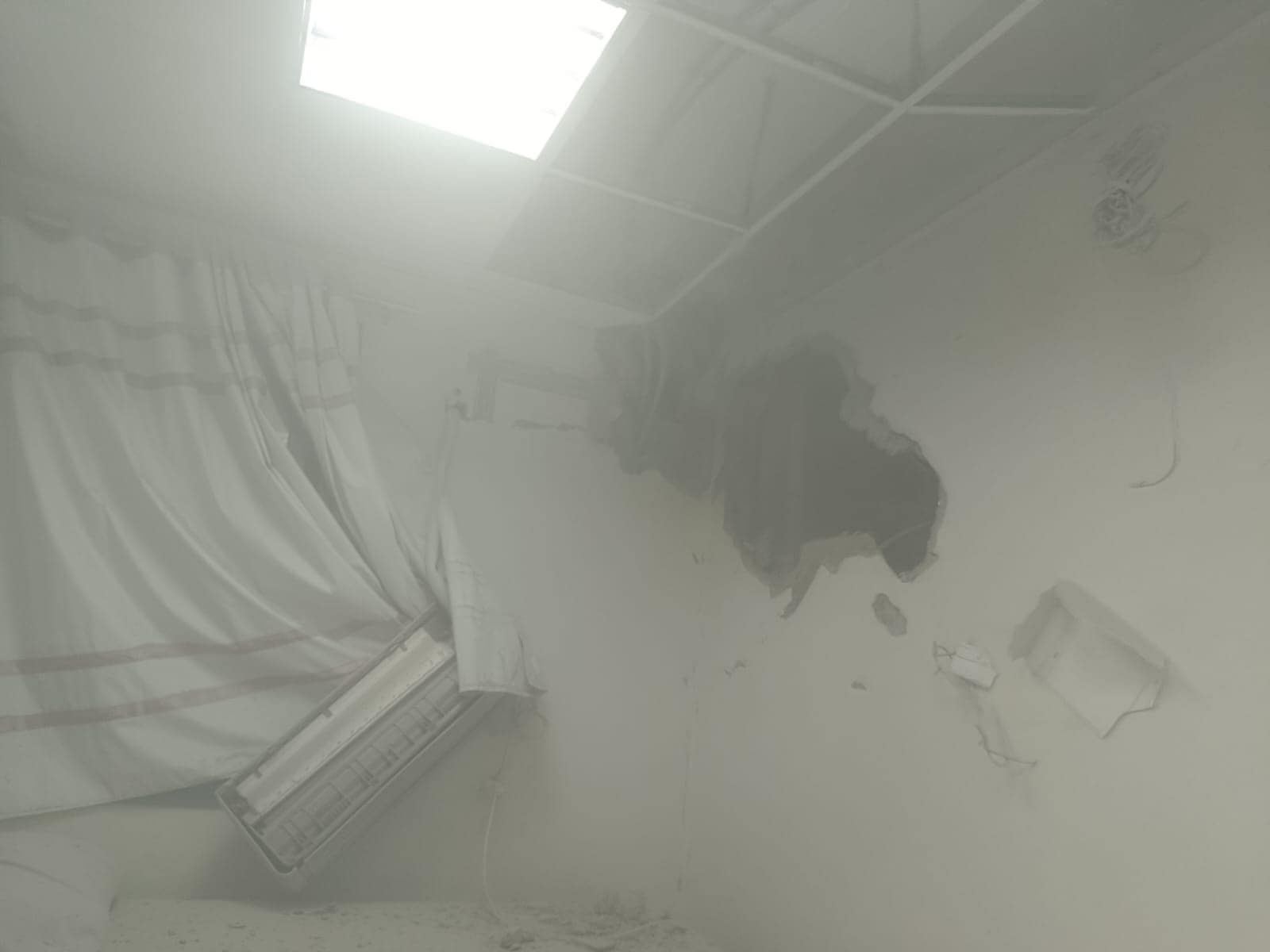
One of the rooms inside the Al-Ahli hospital after the air strike. © Diocese of Jerusalem. Used with permission.
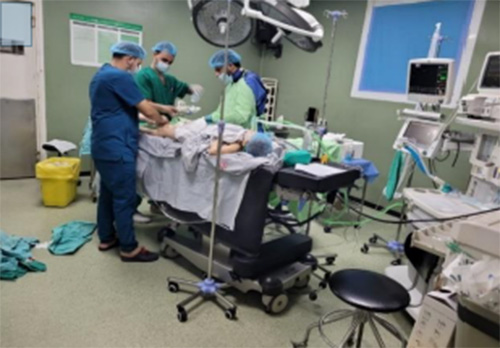
Medical staff at the Ahli are working around the clock to treat people injured in the ongoing war. © Diocese of Jerusalem. Used with permission.
Donation code: AEWB2023
Tax-deductible
Donate Online Now
We appreciate your gift to the Al Ahli Hospital Emergency Appeal.
It will provide urgently needed help to those affected by this disaster.
Click here for other donation options
Need help? Call us 1300 302 663
As noted, this is a tax-deductible project. All donations are in Australian dollars (AUD) and all gifts of $2 or more are tax-deductible.
Gifts are received by the trustee for the ‘Anglicans in Development Ltd’ ABN 86 647 293 481
Gifts will be applied to the support of projects selected. In the unlikely event of projects being oversubscribed or not proceeding to completion, donations will be applied to similar projects.
Please Donate Responsibly